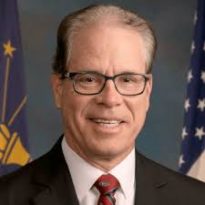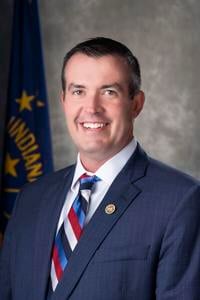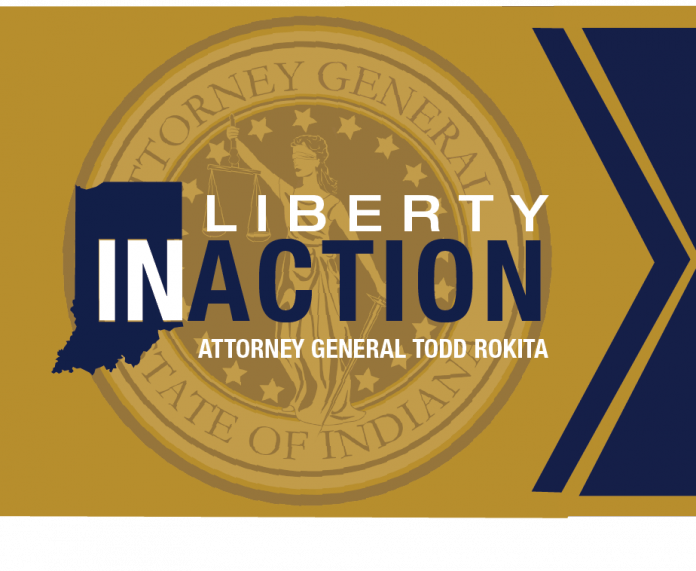USI falls to hot-shooting WIU, 87-62
USI falls to hot-shooting WIU, 87-62
MACOMB, Ill. – University of Southern Indiana Men’s Basketball fell to a hot-shooting Western Illinois University, 87-62, Thursday evening at Western Hall. The Screaming Eagles are 9-16 overall and 4-11 in OVC action, while the Leathernecks go to 9-17, 3-12 OVC.
USI jumped out to a quick 4-0 start, but WIU swiftly bounced back with a 12-4 dash to get control. The Leathernecks would extend the lead to as many as 17 points, 39-22, before an Eagles’ offensive surge cut the margin to single digits, 39-31, in the first half.
WIU scored the final six points of the first half to lead 45-31 at the break. Junior guard Damoni Harrison led the way for USI during the first 20 minutes with 13 points, while junior guard Jayland Randall added nine first-half points.
In the second half, USI was unable to get any momentum going as WIU continued its hot-shooting game. The Leathernecks extended its halftime margin to as many as 28 points (87-59) by shooting 62.1 percent in the final 20 minutes (18-29) and 56.7 percent for the game (34-60).
USI was led in the 87-62 loss by Harrison, who posted his second double-double of the year with 21 points and 10 rebounds. He was followed by Randall, who had 17 points, while sophomore forward Stephen Olowoniyi closed out the double-figure scorers with 10 points.
After the loss, the Eagles are three games out of the OVC post-season race. USI trails the University of Tennessee at Martin and Lindenwood University, who are tied for seventh in the league standings.
Next Up For USI:
The Lions of Lindenwood are 12-14 overall and 7-8 in the OVC after upsetting Morehead State University, 73-60, at home tonight. Lindenwood is 3-2 in the last five games and .500 over the last 10 contests.
The Eagles lead the all-time series, 8-1, after taking the first meeting of the year in January, 80-73. Harrison led three Eagles in double-digits with 26 points and 10 rebounds. He was followed by Randall, who had 17 points, and graduate forward Jack Mielke, who had 10 points.
UE women’s basketball earns second MVC win over Bradley
ANALYSIS: Exploring The Evansville DORA: Will it be like Austin, TX or Shawneetown, IL?
The Evansville City Council’s unanimous decision to establish a Designated Outdoor Refreshment Area (DORA) aims to invigorate the downtown area by permitting patrons to carry alcoholic beverages from participating establishments within a specified zone. As the city prepares to launch this initiative in April, with 22 restaurants and bars on board, it’s essential to consider the potential impacts on economic growth, crime rates, and livability, especially given the concerns of downtown’s predominantly older residents.
Economic Growth
Implementing a DORA can bolster the economic vitality of downtown areas. By allowing patrons to move freely with beverages, these zones can enhance the appeal of downtown districts, potentially increasing foot traffic and benefiting local businesses. For instance, a report from Ohio State University noted that DORAs could support the economic vitality of downtown areas, especially as they recover from the pandemic.
However, the success of a DORA in stimulating economic growth depends on various factors, including effective management, community engagement, and the unique characteristics of the area. It’s crucial to set realistic expectations and recognize that while a DORA can contribute to economic development, it is not a standalone solution. It will also create a need to hire more law enforcement officers to keep downtown Evansville from being a stomping ground for wandering drunks.
Crime and Safety
Concerns about increased crime, such as fistfights and robberies, in areas with relaxed open container laws are valid. However, evidence suggests that with proper planning and enforcement, DORAs do not necessarily lead to higher crime rates. For example, in Montgomery, Ohio, the police department conducts routine patrols and enforces responsible behavior within the DORA, ensuring that the boundaries are strictly maintained and that alcoholic beverages are not carried outside the designated area.
The key to maintaining safety is proactive management, including clear signage, designated patrols, and community involvement. By establishing and enforcing guidelines, Evansville can mitigate potential safety concerns associated with the DORA.
Livability and Community Impact
The introduction of a DORA can have mixed effects on livability, particularly in areas with a significant residential population. In Jasper, Indiana, discussions about implementing a DORA raised questions about its impact on downtown residents and future development.
For Evansville, where the downtown population is relatively small and has experienced slow growth, it’s essential to balance the interests of businesses and residents. Engaging with the community, particularly older residents, to address concerns such as noise, litter, and safety will be crucial. Implementing measures like restricted hours, designated consumption areas, and regular clean-up efforts can help maintain the quality of life for downtown inhabitants.
Conclusion
As Evansville moves forward with establishing its DORA, the city can look to the experiences of other communities to anticipate potential outcomes. While DORAs offer opportunities for economic enhancement and increased vibrancy, they also require careful planning and management to address concerns related to crime and livability. By proactively engaging with residents, enforcing regulations, and fostering collaboration between businesses and law enforcement, Evansville can work towards creating a DORA that benefits the downtown residential community.
FOOTNOTE: This article was posted by the CCO without bias, opinion, or editing.
Love—and then some health-care legislation—was in the air in the Indiana House

In a place where there can be no love lost, Rep. Vernon G. Smith, D-Gary, took a moment to celebrate love by distributing Valentine’s Day stuffed animals to legislators on both sides of the aisle.
But after the pink bears and bandana-wearing dogs were happily displayed on desks, it was back to business as usual.
A number of bills read in the House on Thursday would impact Hoosier health care, with a common theme being accessibility and affordability.
House Bill 1024 received bipartisan support and will continue to the Senate, sponsored by Sens. Rick Niemeyer, R-Lowell, and Mike Bohacek, R-Michigan Shores. The author, Rep. Harold Slager, R-Shererville, explained that the bill would continue Medicaid reimbursement for some children’s hospitals in neighboring states.
“This is a really popular program, and interestingly, the cost is not that high,” said Slager.
Rep. Earl L. Harris Jr., D-East Chicago, was one of the members who spoke in support of the bill. He shared a personal anecdote of a young cousin who had to come from Northwest Indiana to Indianapolis to receive proper medical care. This was before the law, which would have allowed the child to visit a closer hospital in Chicago.
“This has been a great move,” said Harris. The bill passed with 91 yea votes and zero nays.
House Bill 1555 aims to expand health-care accessibility for Hoosiers by allowing limited medical licensure to those who were trained internationally. The providers would need to meet certain criteria, and after five years of practice, the board may choose to provide them an unlimited license.
“House Bill 1555 is an important step towards addressing two critical challenges in our health care system: rising costs and the ongoing shortage of medical professionals, particularly in rural and underserved communities,” Rep. Beau Baird, R-Greencastle, the bill’s author, said.
The bill received 91 yeas and one nay from Rep. Ryan Dvorak, D-South Bend. It will be sponsored in the Senate by Sens. Liz Brown, R-Fort Wayne, Jean Leising, R-Oldenburg, Susan Glick, R-LaGrange and Sen. Andrea Hunley, D-Indianapolis.
House Bill 1666 by Rep. Julie McGuire, R-Indianapolis, would require more transparency from health-care providers in relation to ownership. It would require a merger review through a board, which would approve or deny merger requests. This process would have a 90-day limit.
“Patients, providers and the public need to trust that health-care decisions are made based on the best interest of the patient, rather than hidden financial motives,” said McGuire.
Rep. Maureen Baur, D-South Bend, spoke in opposition to the bill, raising concerns about specific measures it has outlined.
“While transparency in health care is essential, this bill introduced some measures that could have unintended and detrimental consequences for our state’s health-care system,” said Baur. She highlighted smaller and specialty health-care providers as particularly vulnerable to the review process and the burden it may place on them.
Rep. DeLaney, D-Indianapolis, also spoke in opposition to the bill.
“I understand that there’s a real desire to deal with medical costs. We have bill after bill, year after year, to deal with it. My belief is, we do not have, as a state, the economic, political, legal power to effectively touch that market,” said DeLaney.
Rep. Ben Smaltz, R-Auburn, is one of the co-authors on the bill.
“We want to discover conflicts of interest,” he said of the bill’s intentions. “If a merger doesn’t get approved, there’s a reason for that.”
The bill passed with 70 yeas and 25 nays. Senate sponsors are Sens. Tyler Johnson, R-Leo, Chris Garten, R-Scottsburg, and Ed Charbonneau, R-Valparaiso.
STATEMENT: Gov. Braun collaborates on Avian Flu effort in Indiana
INDIANAPOLIS – Governor Mike Braun issued the following statement regarding Avian Flu monitoring in Indiana.
“Hoosiers can rest assured that state government is monitoring the Avian Flu situation. At my direction, there is regular collaboration between the Indiana Board of Animal Health (BOAH), Indiana Department of Agriculture, Indiana Department of Natural Resources (DNR), and Indiana Department of Health (IDOH) and I receive regular interagency briefings.
“The Indiana Department of Agriculture, working with the Board of Animal Health, is engaging with poultry producers, whether large scale or hobby farms, to ensure close communication and cooperation. DNR is monitoring the situation as it impacts recreation, hunting, and sports. IDOH is responsible for monitoring potential human exposure to the Avian Flu. I am grateful for the cooperation and leadership of Lt. Gov. Micah Beckwith; Cabinet Secretary Suzie Jaworowski, Office of Energy and Natural Resources; and Cabinet Secretary Gloria Sachdev, Office of Health and Family Services, as they coordinate these efforts.”
While the health risk to the public is classified as low, Hoosiers and poultry owners who notice sick or dead birds should not touch the bird and instead contact their veterinarian or the Healthy Birds Hotline, 866-536-7593.
OPINION: Will This Be the Year That Indiana Legalizes Weed?
The Debate on Marijuana Legalization in Indiana: Pros and Cons
By Johnny Kincaid
FEBRUARY 14, 2025
Once again, the Indiana legislature is debating whether or not to make marijuana possession and use in the state.
Whenever the topic comes up, I flashback to my senior year in high school. It was 1975, and, yes, I inhaled… A LOT! Drug use among high school students was the highest during the mid-70s. I never thought that the momentum for legalization would ever reach current levels.
With neighboring states embracing cannabis reform, the debate over whether to legalize marijuana within our borders has intensified. There are compelling arguments on both sides of this issue, so it is essential to weigh both the potential benefits and drawbacks.
The Case for Legalization
Economic Growth and Tax Revenue: Legalizing marijuana could significantly boost Indiana’s economy. States like Colorado and Illinois have generated millions in tax revenue from cannabis sales, which funds education, infrastructure, and public health programs.
Criminal Justice Reform: As a prison ministry volunteer, I have met many guys doing fairly long stretches for possession. While I hate seeing a guy taking time to get high, I still am not ready for legalization.
Medical Benefits: For the past 50 years there have been claims of the medicinal benefits of pot, alleviating chronic pain, anxiety, epilepsy, and other medical conditions. Is THC medicine or not?
The Case Against Legalization
Public Safety Concerns: Opponents worry that legalization could lead to an increase in impaired driving incidents and workplace accidents. THC (the active ingredient in pot) is fat soluble instead of water soluble, so instead of quickly being flushed from the body like alcohol and other drugs, THC can linger in the system for up to six weeks. For this reason, law enforcement agencies struggle to establish accurate roadside impairment tests for marijuana use.
Health Risks: While marijuana has medicinal properties, excessive use can have negative effects, including cognitive impairment, addiction, and mental health issues. Some medical professionals caution that legalization could lead to increased use, particularly among young people, whose developing brains may be more vulnerable to long-term effects.
Regulatory Challenges: Establishing a legal cannabis market requires comprehensive regulation and oversight to prevent illicit market activity, ensure product safety, and address potential workplace policies regarding employee use. Indiana would need to develop a robust regulatory framework to manage the industry effectively.
Finding Common Ground
The decision to legalize marijuana in Indiana is complex and multifaceted. While legalization offers potential economic and social benefits, concerns about safety, health, and regulation cannot be ignored.
FOOTNOTE: This article was posted by the CCO without opinion, bias or editing.
Indiana Chapter of the National Tooling and Machining Association Competition at Vincennes University
Indiana Chapter of the National Tooling and Machining Association (INTMA) High School Machining Competition at Vincennes University.
The competition will bring together around 90 students from nearly a dozen high schools across Indiana. They will compete in rigorous machining challenges that highlight the essential skills driving today’s modern manufacturing industry.
Competitors will showcase their skill sets in CNC technology through programming and milling competitions. Participants will also engage in precision exercises in manual machining, including manual milling, manual lathe work, and surface grinding – skills that are foundational to manufacturing.
An employer fair will also take place.
WHEN:
Saturday, Feb. 22, 2025
8 a.m.-noon (ET)
WHERE:
Vincennes University Technology Center
- HURCO Center, Room A116 and A118
- Manual Machining Lab, Room 100
1300 N. Chestnut St.
Vincennes, Indiana
47591
Insidious fraudster sentenced to 10 years, ordered to pay nearly $2M
This article was provided by Todd Rokita’s office.
Attorney General Todd Rokita worked with the Federal Bureau of Investigation to take down a Southside Indy-based serial fraudster, James Henley, and secured an order for him to pay back nearly $2 million in restitution. Henley has been sentenced to ten years in federal prison, followed by three years of supervised release after pleading guilty to aggravated identity theft, conspiracy to commit access device fraud, two counts of money laundering, and eight counts of wire fraud. Henley has also been ordered to pay $1,887,426.63 in restitution.
Henley reportedly told federal agents, who worked alongside Indiana’s Homeowner Protection Unit, he was inspired in part to commit mass fraud after watching a crime TV show.
“Our attorneys and federal investigators made sure this man was prosecuted for these flagrant and insidious criminal acts against regular Hoosiers,” Indiana Attorney General Todd Rokita said. “I’m certainly proud of everyone who works in our own Homeowner Protection Unit for their role in helping bring this blatant perpetrator of fraud and theft to justice. We will continue holding accountable all those who aim to enrich themselves by illegally deceiving and exploiting innocent victims.”
As part of his fraud schemes, Henley registered five fake businesses (OnTrack Real Estate Solutions, LDI Investments Corp, Lucario Investments, 317 Traffic, and Henley Real Estate Solutions) with the states of Indiana and Kentucky, claiming to serve as the Chief Executive Officer for majority of them – yet none of the businesses were legitimate. Henley used the businesses to mask his identity, make his schemes appear more credible, and launder the stolen money resulting in a total loss of $2,927,758.95 to individual homeowners, an Indiana attorney, a bank, and ten state governments.
Henley’s schemes are broken down as follows:
COVID-19 Fraud:
Between May 2020 and March 2021, James Henley, his wife Jameka Henley, and his associate Jimmie Bickers used the stolen personally identifiable information of 76 real individuals to submit 120 unemployment insurance applications to ten states during the COVID-19 pandemic. Once the applications were approved, the trio used 65 unemployment insurance debit cards to make purchases at retailers and withdraw cash at ATMs in the Evansville and Indianapolis areas. The states paid a total of $1,119,426.63 in unemployment benefits in connection with the group’s fraudulent applications. In July 2020, Henley used funds withdrawn from ATMs to buy a Chevrolet Camaro for $22,801.
Bickers and Jameka Henley have been formally charged for their roles in this scheme but have not pleaded guilty.
Home Title Fraud:
Between December 2021 and May 2023, Henley stole five homes in Indianapolis by filing fraudulent deeds with the Marion County Recorder’s Office. Through the filings, Henley claimed that the homeowners had sold their homes to his fake businesses, but, in reality, he had never even spoken with the homeowners. Unbeknownst to the victims, Henley filed these fraudulent deeds and then sold the homes for significantly less than their market value, pocketing more than $260,000 in profits.
Henley also attempted to steal and sell an additional 14 homes in Indianapolis and Evansville. With one exception, the individuals who bought the homes from Henley took possession and ultimately kept the homes.
For one homeowner, the property Henley stole was her childhood home. She purchased the home while her mother was in the hospital with the hope that, when her mother’s condition improved, her mother would be able to live out her remaining years in the house.
Mortgage Fraud:
In November 2021, an associate of Henley’s purchased a home in Indianapolis, using a mortgage loan from a bank. In April 2022, Henley filed a fraudulent document with the Marion County Recorder’s Office to make it seem as if the mortgage loan had been paid off, when it had not been paid. Henley then filed a deed naming himself a joint owner of the home. Henley and his associate subsequently sold the property for $255,000, pocketing all the proceeds, even though the bank should have received the majority of the funds.
Auto Loan Fraud:
In March 2023, Henley purchased a Dodge Durango in Indianapolis for $71,479, using an auto loan from Everwise Credit Union. A few months later, in June 2023, Henley purchased a Chevrolet Silverado in Plainfield for $54,270, using a second loan from Everwise Credit Union.
In October 2023, Henley connected a JPMorgan Chase bank account to his auto loans, via Everwise’s online payment portal. Henley falsely represented that the Chase account belonged to Jimmie Bickers, and that he had authority to make payments on his loans using funds from the Chase account.
The Chase account was actually an Indiana attorney’s Interest on Lawyers’ Trust Account (IOLTA), which is a highly regulated bank account used by lawyers to hold client funds. The interest earned on IOLTA accounts is used to fund grants for nonprofit groups that promote pro bono and access to justice programs. Henley did not have the attorney’s permission to access or withdraw funds from the IOLTA account.
Between October and November 2023, Henley used the IOLTA account to make two payments, totaling $98,000, toward his auto loans.
Henley has prior felony convictions for financial crimes, including theft, forgery, and fraud.
“I would also like to thank HPU Investigator Lynn Wilkins for her respective role in assisting the FBI in uncovering the deed fraud,” Attorney General Rokita said. “We are lucky to have public servants like her working every day to ensure that our office does everything that we can to protect Hoosiers.”
The Homeowner Protection Unit remains dedicated to protecting the rights of tenants and ensuring equal access to safe housing. This victory underscores the commitment of the Office of the Indiana Attorney General to uphold the law and protect Hoosiers from deceptive practices.
The mission of the Homeowner Protection Unit is to protect the rights of all individuals involved in the housing market, including tenants, homeowners, and aspiring homeowners, by investigating and redressing deceptive acts in connection with mortgage lending and violations of relevant state and federal laws.
Hoosiers with consumer complaints are encouraged to contact the Office of the Attorney General by visiting indianaconsumer.com or calling 1-800-382-5516.
FOOTNOTE: This article was posted by the CCO without bias, opinion, or editing.











